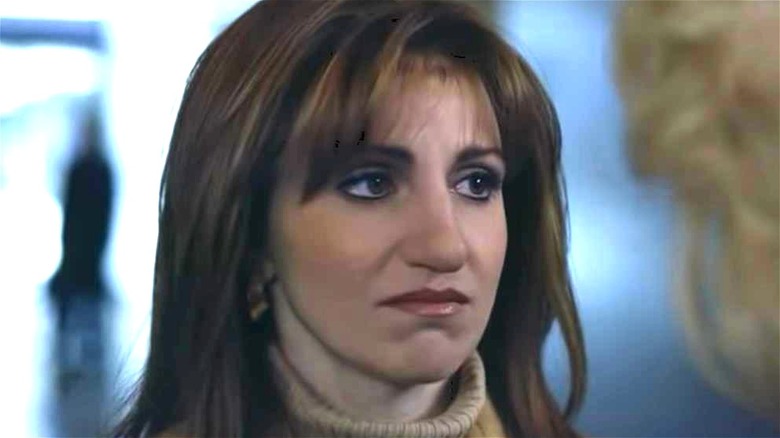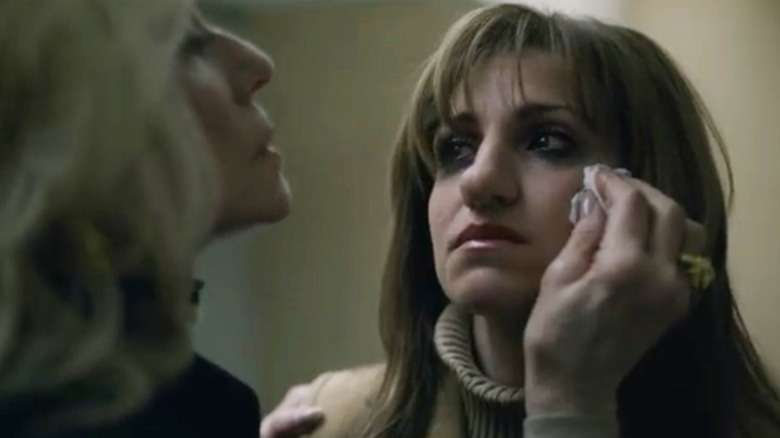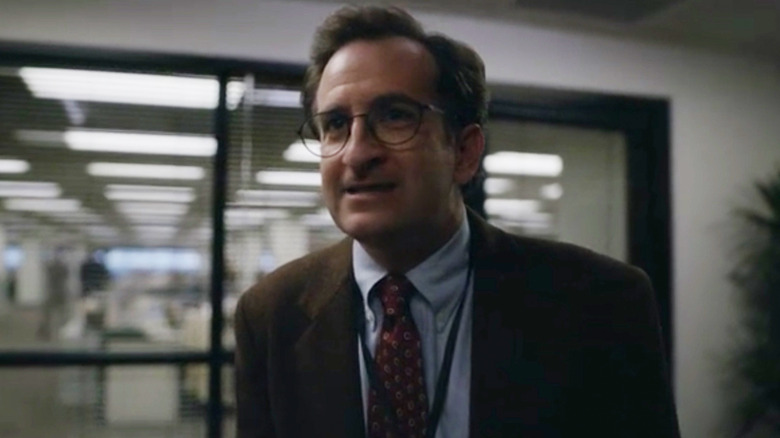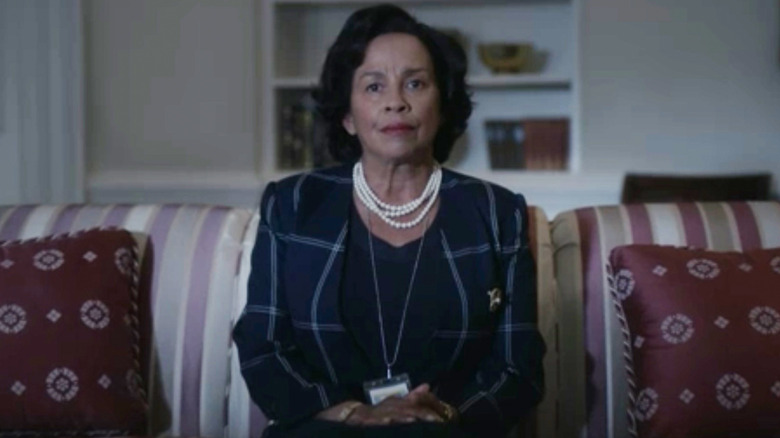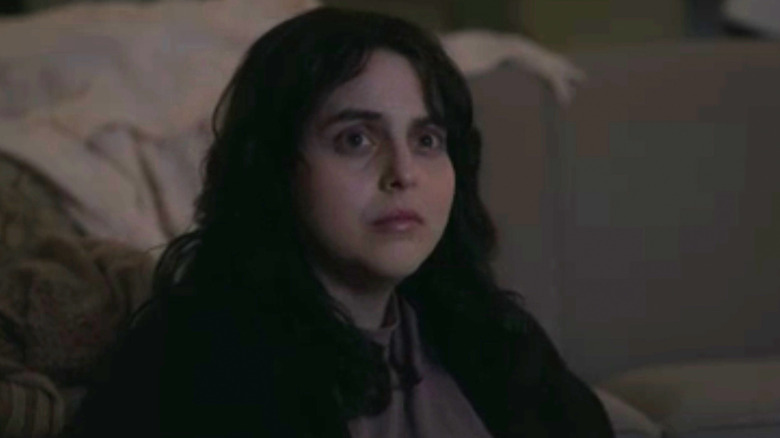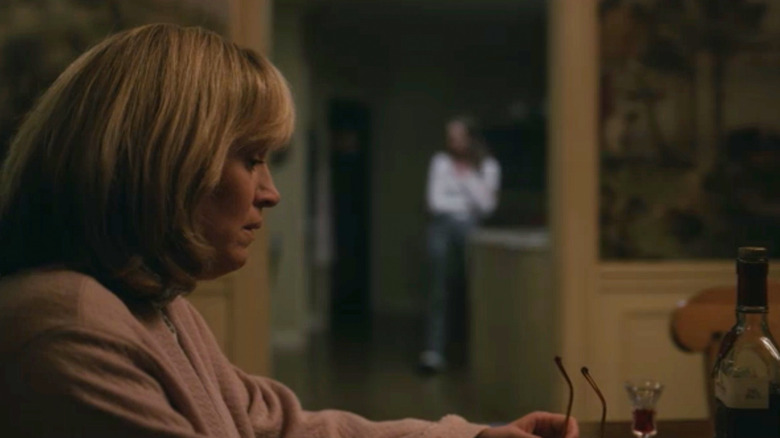How Accurate Is Impeachment: American Crime Story Episode 7?
"Impeachment: American Crime Story" is the latest season in the FX anthology series that dramatizes a headline-grabbing scandal from recent American history. After Season 1 explored the O.J. Simpson murder trial and Season 2 covered the killing of Gianni Versace, Season 3 chronicles the political scandal stemming from President Bill Clinton's (Clive Owen) extramarital affair with White House intern Monica Lewinsky (Beanie Feldstein), as well as Paula Jones's (Annaleigh Ashford) lawsuit against Clinton for sexual harassment while he was the governor of Arkansas.
In Episode 7, "The Assassination of Monica Lewinsky," which aired on October 19, 2021, Bill Clinton finally sits for his deposition with Jones's lawyers. Meanwhile, as Lewinsky and her lawyer Bob Ginsburg (Fred Melamed) negotiate with special counsel Ken Starr (Bob Bakkedahl) for immunity in exchange for her testimony, the news of their affair finally goes public thanks to online reporter Matt Drudge (Billy Eichner). When it does, it immediately becomes front-page news and late-night talk show fodder. While Lewinsky and her former friend and confidante Linda Tripp (Sarah Paulson) watch as the media mercilessly mocks them for their personal appearances, President Clinton and First Lady Hillary Clinton (Edie Falco) scramble to come up with the administration's official response.
Like all episodes in "Impeachment," this one is a blend of fact and fiction. Here are the major factual accuracies and inaccuracies in Episode 7.
Clinton's deposition: partly accurate
Early in the episode, Paula Jones and President Clinton finally come face to face when Clinton sits for his deposition. Clinton denies the sexual harassment and that he ever met Jones. Outraged, Jones excuses herself to regain her composure in a bathroom, while her legal advisor Susan Carpenter-McMillan (Judith Light), consoles her. Finally, Clinton is surprised when Jones's lawyers begin asking him about details involving his relationship with Lewinsky, which he didn't previously know Jones's team was aware of.
The two major inaccuracies in this scene are the moment when Clinton lies about ever meeting Jones and when Jones leaves the room. According to Madeleine Kaplan, researcher on Slate's "Slow Burn" podcast about the Clinton impeachment scandal, Clinton didn't flat-out state that he never met Jones. His denial was more vague–he claimed that he didn't remember meeting her, since he meets so many people. Jones also didn't leave the six-hour deposition until the end. While it was no doubt an emotionally grueling experience, this moment is a bit more dramatic (via Vulture).
Newsweek's decision to hold the Lewinsky story: missing context
The moment when Jones's lawyers ask Clinton about Lewinsky is also the moment when it becomes clear that the Clinton-Lewinsky story is about to become public knowledge. At "Newsweek," reporter Michael Isikoff (Danny Jacobs), who's been pursuing the story all season, is all set to publish his detailed account of the Clinton-Lewinsky affair. He's thwarted when his editor decides to hold the story, on the grounds that they don't have enough corroborating evidence that the affair actually happened. "Sometimes, it's just not worth being first," the editor says. That night Internet muckraker Matt Drudge calls Isikoff for a comment about a story he's writing on "Newsweek's" decision. The next day, Drudge publishes his article, and the Clinton-Lewinsky scandal explodes.
It's true that "Newsweek" held the story because it didn't feel there was enough evidence to back up Lewinsky's allegations. At the time, "Newsweek" only had access to one 90-minute tape of phone calls between Lewinsky and Tripp, which they didn't feel was sufficient (via Slate).
However, one crucial piece of information "Impeachment" leaves out is why "Newsweek" didn't have any corroborating evidence to back up the tapes. According to Kaplan, when Ken Starr's team learned that Isikoff was working on the story, they discouraged him from speaking to any of the players involved, like Vernon Jordan. "Impeachment" omits the major role that Starr's team played in "Newsweek's" decision to hold the story (via Vulture).
Clinton asking Betty Currie to lie: accurate
After his deposition, an alarmed President Clinton looks for a way to protect himself from fallout over his relationship with Lewinsky, which is about to become public. Clinton decides to deny ever being alone in a room with Lewinsky — which we know is a lie, because we've seen them alone together many times over the course of the season — and to corroborate this, he turns to his secretary Betty Currie (Rae Dawn Chong). In a disturbing scene, Clinton calls Currie into the White House on a Sunday and pointedly asks her to help him recall his previous interactions with Lewinsky, making it clear that he expects her to back up his story.
In reality, Currie appeared before a grand jury five separate times to testify about Clinton's relationship with Lewinsky. Currie confirmed that while the Sunday meeting did take place, "[Clinton] had not tried to influence her" (via The Washington Post).
However, the Starr Report reached a different conclusion. "In a meeting with Betty Currie on the day after his deposition and in a separate conversation a few days later, President Clinton made statements to her that he knew were false," the report reads. "The contents of the statements and the context in which they were made indicate that President Clinton was attempting to influence the testimony that Ms. Currie might have been required to give in the Jones case or in a grand jury investigation." The Starr Report goes on to say that during the meeting, Currie understood that "the President wanted her to agree with him" that he'd never been alone in a room with Lewinsky, even though she knew this to be true (via The Washington Post).
It appears "Impeachment" is following the Starr Report's version of events.
Lewinsky's reaction to becoming headline fodder: accurate
When the Clinton-Lewinsky scandal is finally exposed, it becomes both front-page news as well as the subject of endless jokes on late-night TV. Anyone who lived through this scandal remembers how much the story dominated the media. But how Lewinsky and Tripp reacted is less well-known.
Under the advice of their lawyer, Lewinsky and her mother stay out of the public eye. Lewinsky is devastated by the media coverage. But when her mother urges her to turn the TV off, Lewinsky refuses, saying that she'd rather know what people are saying about her.
According to Kaplan, this is accurate. Part of the reason Lewinsky subjected herself to all that negative TV coverage was because she did indeed want to know what people were saying about her — especially the people from her past who came forward to disparage her character.
But it's also worth noting that under Ginsburg's advice, Lewinsky and her mother were forbidden from even leaving their apartment, which didn't give them many ways to kill their time (via Vulture).
Tripp's reaction to becoming headline fodder: mostly accurate
Meanwhile, when Linda Tripp and her children tune in to watch "Saturday Night Live," everyone is shocked to see John Goodman portraying her in drag. Later, Tripp's daughter Allison (Emma Malouff) consoles her mother over the mean-spirited jokes. Tripp says that she's no stranger to jokes about her appearance. Then she relates a story from her junior year of high school, when classmates nicknamed her "Gus," after Gus Johnson, a tall basketball player. Tripp reassures her daughter that she's used to being insulted and that it doesn't bother her.
First, the "Gus" story is accurate. In 1998, several of Tripp's classmates told The Washington Post about the nickname and its origins. According to her classmates, "The nickname was a humiliating put-down...Linda was 5 feet 10 and solidly built. She hated cameras. She wanted to blend in, and disappear."
As for whether the "Saturday Night Live" sketch bothered Tripp, that's less clear. According to "The New York Times," Tripp was "deeply hurt" by how she was portrayed in the media, to the point that it drove her to get plastic surgery. Tripp also told Larry King in 2001 that she found John Goodman's portrayal "hurtful" (via CNN).
That would seem to contradict "Impeachment's" portrayal of Tripp as unbothered by it. But it's also entirely plausible that in this moment, Tripp simply put up a brave front to reassure her daughter.
If you or anyone you know has been a victim of sexual assault, help is available. Visit the Rape, Abuse & Incest National Network website or contact RAINN's National Helpline at 1-800-656-HOPE (4673).
